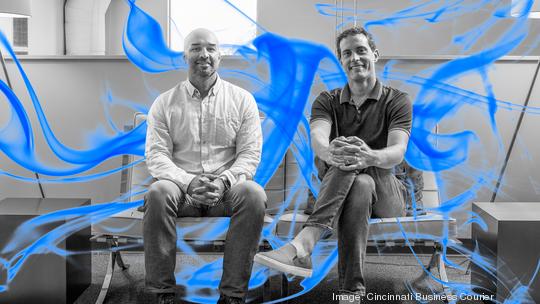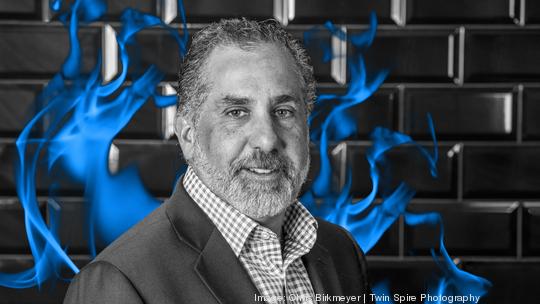Shashank Saxena certainly didn’t take the traditional path to entrepreneurship.
Before he co-founded Mason-based startup Vndly in 2017, Saxena spent four years at Kroger Co. as a corporate strategy leader. Prior to that, it was a similar stint at CitiBank. The roles offered exposure, opportunity and financial security.
He decided to take the leap when he saw a chance to improve the often slow and clunky tech recruiting industry. Leaders in other, similar C-suite-adjacent seats aren’t always as risk averse.
“Startups are brutally hard,” Saxena said. “The sacrifices that come as part of the journey are not something everyone is willing to pay.”
But Vndly’s exit – the company in November inked a $510 million acquisition deal with Silicon Valley giant Workday – is sure to move potential founders off the bench. A sale like this often spurs a flywheel effect. Employees branch out to start new ventures. More investors open their wallets, hoping to catch the next big wave. “It moves the needle,” Saxena said. “This proves there’s financial viability to go on this journey.”
Vndly tops Cincy Inno’s “Startup of the Year” as part of our annual “Fire Awards,” our premier recognition for companies and people setting the local innovation economy ablaze. But it doesn’t stand alone.
Enable Injections, 80 Acres Farms and Astronomer have all raised record-setting nine-figure funding rounds, almost in succession.
The Cincinnati startup ecosystem is beginning to see an influx of young talent. Pieces, an Over-the-Rhine venture-backed tech company, is led by mostly 20-somethings, and Clean Earth Rovers, which is developing a Roomba-like device to clean plastic out of coastal waters, includes a mix of recent Xavier University and University of Cincinnati graduates.
They are among 45 total finalists across nine award categories presented this year. The winners, like Vndly, stand out among the region’s fastest-growing, most innovative and impactful.
Startup of the year

Workday’s acquisition of Vndly in November was a full-circle moment for Shashank Saxena and team. Not only was the sale the region’s largest startup exit on record — with a $510 million price tag — but it could pay long-term dividends for the Cincinnati startup ecosystem at large.
Saxena, a former senior executive at Kroger, launched Vndly five years ago. Its workforce and vendor management technology helps companies handle their entire non-employee lifecycle, from hiring and training to payment and offboarding.
The sale to Workday “surprised a lot of people,” Saxena said, but it was very much a complementary move.
While Workday’s human capital management, or HCM, software serves as a “system of record” for full-time employees at Fortune 500 companies, Vndly’s HCM serves as a “system of record” for non-employees (Saxena said about 40% of workers at Fortune 500s are non employees, contractors or freelancers).
“We’ve always been huge admirers of what Workday has done in the space – the way we built product, the way we designed applications, the way we built our go-to-market (strategy) was heavily influenced by Workday’s journey,” he said. “Calling that company home is a very proud moment for us all.”
Workday, Saxena said, is committed to growing its Mason office, which gives the region a direct link to Silicon Valley. And Vndly’s exit could leave a monumental mark. Some from within the company will inevitably leave after finishing their earnouts to launch new startups. Talent from other big companies, perhaps, could be inspired to take a similar leap because they see potential success. Investors are increasingly willing to take a chance on a new or next set of entrepreneurs after logging a big return.
The latter, at least, has already begun. In February, Saxena’s brother, Somesh Saxena, landed $4 million in seed funding from Bowery Capital and Epic Ventures, two former Vndly investors, for his new data startup, Pantomath. Partners from the firms said they are watching the region with a much closer eye.
“Every city has to build that flywheel effect,” Shashank Saxena said. “In Cincinnati, hopefully we’ve got (that) in motion and once it catches momentum, the exits will only get bigger.”
— Liz Engel
Best tech

Some startups are all about the glitz and glamour. But Pieces, the Over-the-Rhine tech startup developing a first-of-its-kind productivity platform that allows developers to save, find and share file fragments, or smaller snippets of a project, continues to work largely heads-down. Even as the company leans into a new eight-figure Series A funding round – with larger sights set on an eventual Dropbox-like billion-dollar IPO. “It’s no fluff. No nonsense. And it’s been paying off,” co-founder and CEO Tsavo Knott said.
There’s still the same level of excitement as in 2020, when Knott and fellow Miami University grad Mack Myers launched the company. But these days, they’re laser focused on the team. The next several months could be “pretty intense,” Knott said.
“We’re trying to build the next Google in Cincinnati,” he said. “We’re solving hard problems, and the bar keeps getting higher and higher. This is a product that’s changing the way people work, and there’s so much room for growth.”
Pieces initially rolled out its go-to-market product to developers. It will target designers next, then animators. By the end of the first quarter of 2022, the company had gained 15,000 total users, with a daily use rate of more than 30%, a number Knott said proves Pieces’ “stickiness.” The company is on track to triple its users every quarter this year to top 100,000. In 2023, that count could continue to quadruple.
Pieces has nearly 30 employees around the globe and is poaching top-talent from Facebook and others. Knott said a new, and much larger office space, is also on the horizon.
— Liz Engel
Venture capital firm

Covington growth equity firm EGateway Capital is all-in on digital commerce. Since launching 16 months ago, its team has funded five companies, all of which are making moves across the e-commerce value chain, defining how goods are marketed, sold, transacted and delivered.
Its investments have hit all over the map. While 80 Acres is based in Hamilton, EGateway’s portfolio touches Los Angeles (Flowspace, Cargomatic), Austin (SamCart) and San Francisco (Firework). Still, the firm continues to upsell the region, especially given its success in attracting Wayfair, DHL and Amazon.
Case in point, eGateway is helping Firework hire and scale a small team here. Firework uses livestreaming and short videos, much like the platform TikTok, to drive online conversions for brands. Cargomatic and Flowspace also have employees in the region.
“Since we’re playing downstream and investing in well-capitalized companies – that are in position to scale and add jobs – when we find opportunities to tell the story about our region, we do,” managing director Chad Summe said.
On the M&A advisory side, the firm has added four new people and now employs 11.
EGateway initially launched with a $20 million fund and is looking to quintuple that effort with a $100 million raise, per Securities and Exchange Commission filings.
“We’re focused on executing and engaging in a different way to add value,” Summe said. “The reception has been exciting, and we see huge opportunity.”
— Liz Engel
Women-led startups

It’s a startling statistic: In 2021, only 2% of venture capital funding went to women. Since raising $10 million in March, the all-female team behind HerMD has unapologetically pushed forward with its plan to extend its care model across the U.S.
And only about a third of OB-GYNs are trained in sexual health and wellness. HerMD’s goal is to eliminate disparities and reduce stigmas in women’s health care.
“We’re big dreamers, and we believe women need access,” said Komel Caruso, HerMD’s chief growth officer.
The firm, which offers gynecology services with a focus on sexual health and wellness, plans to open 10 offices over the next 18 months. HerMD also seeks to have a telehealth presence in all 50 states.
The startup sees huge opportunities in e-commerce. It’s “extremely difficult,” Caruso said, for women to find over-the-counter options for menopause and sexual health care. The goal is to create a marketplace of physician-curated products with an educational component.
HerMD wants to invest in data and research, as there are too few FDA-approved treatment options in the space. And the company will be looking to launch a workplace-based menopause wellness program in the coming year.
“Women are leaving boardrooms at the prime of their careers because they’re embarrassed about hot flashes or incontinence,” she said. “We’re excited about where this can go.”
— Liz Engel
Sustainable startups

Michael Arens was in high school when he came up with the original idea for Clean Earth Rovers. A classmate had given a presentation on the mounting problem of ocean plastics, and Arens became “obsessed” with finding a solution.
After paring down his initial idea, and a rigorous customer discovery process, Clean Earth is ready for deployment to marinas, coastal businesses and municipalities. The company’s “Plastics Piranha” an autonomous rover that works much like a Roomba but for coastal waters, skims the surface to collect waste and debris. Clean Water is scheduled to make its first foray into San Francisco with pilots pending in Manhattan and Victoria, British Columbia.
The company is outfitting each Piranha with sensors to monitor water quality and detect harmful toxins like blue-green algae or E. coli. Clean Earth is spinning that innovation out as a separate technology, further expanding its prospective customer base.
“There’s a lot of potential,” Arens said. “It tackles a very visual problem.”
In terms of overall impact, if Clean Earth Rovers hits its obtainable market, the company anticipates it could intercept 15% of U.S. annual plastic waste for reuse. For marina owners, that’s critical.
“For a lot of people on the coasts, it’s not about money. The water is their livelihood,” he said. “It’s what they’ve grown up around. It’s what they know. And they want to protect it.”
— Liz Engel
Health care & biotech

Blue Ash-based startup Standard Bariatrics appears to be next in a long line of Greater Cincinnati medtech success stories. Since it received a key FDA approval for its flagship product, the Titan SGS, in April 2021, sales have grown exponentially. It appears the only thing holding the company back at this stage is the ability to hire enough people to sell it.
The Titan SGS, a surgical stapler, features a first-of-its-kind design to help surgeons more easily perform laparoscopic sleeve gastrectomy, a common weight loss procedure. The company’s goal is to make bariatric surgery safer and more repeatable.
While its focus may seem limited in scope, Dr. Jon Thompson, Standard Bariatric’s founder and chief medical officer, said about 200,000 sleeve gastrectomy procedures are performed in the U.S. each year (for comparison, the number for appendectomies stands around 300,000).
That accounts for only 1% of the obese patients in the U.S. eligible for the surgery.
“There’s a stigma. People (are still told to) eat less, exercise more. But the odds of success with that are almost zero when your BMI is 40 or above,” Thompson said. “We had investors in our Series B (fundraise) pass (on the round), because they said, ‘It’s not like it’s atrial fibrillation.’ It’s actually several times the atrial fibrillation market. It’s just nobody’s doing anything about it.”
Standard Bariatrics currently has a team of more than 50, nearly triple its employee count from last year. Given the Titan’s quick adoption, the company is adding sales reps and new territories as fast as possible. It’s trained more than 50 surgeons to use the device – and counting.
Adam Dunki-Jacobs, Standard’s dual chief of operations and chief technology officer, said the company is on track to become profitable month-over-month by next year. Standard Bariatrics is generating more than $1 million in sales each month. While a fundraise isn’t likely in 2022, preparations are being made for an eventual IPO.
“We’re becoming a big company very fast,” Thompson said.
— Liz Engel
Future of work

A year ago, Cincinnati-based startup Hearty was on the fast track. A professional network built on personal connections, the company’s platform was designed to take traditional resumes a step further, with profiles serving as snapshots for users’ reputations and referrals coming only from people they know and trust.
At its formal launch, Hearty had $1.1 million in capital backing, roughly 1,000 users and plans to move to new offices in Blue Ash. And while the company’s capital stack and office remain the same as a year ago, its user base has swelled to almost 6,000, said co-founders Bob Gilbreath and Ryan Watson, both former Ahalogy executives.
But over the past year, Hearty introduced its premier product and revenue driver – a new take on the traditional recruiting model.
The idea sprung out of conversations with companies struggling to find workers, particularly fast-growing West Coast startups who were finding it difficult to compete for talent with Google, Amazon or Facebook. With the rise of remote work, companies can utilize Hearty’s network of vetted connections to hire outside their home markets for less while still accessing top talent.
Thus far, 30 firms have partnered with Hearty for hiring. “We see a ton of opportunities to use our software in finding talent,” Gilbreath said. The Hearty team eventually plans to expand its recruiting offerings outside of software engineering. “The future of job search has got to go beyond a resume or LinkedIn page.”
— Meg Erpenbeck
Fintech

Last year ended on a high note for Luma Financial Technologies. In December, the downtown-based company partially closed a massive fundraising campaign, bringing in $30 million, claiming the title of Cincinnati’s best-funded fintech.
But that wasn’t Luma’s only success.
The company expanded its product offering, opened an office in Switzerland, and cut a deal for a larger office in the city center to accommodate its team, which should hit 200 by the end of the year. But CEO Tim Bonacci isn’t done.
“Our goals are to continue global expansion, drive leadership in our segment of the market and never waver from our mission to provide solutions to advisers,” he said.
The company is already pushing into Canada thanks to funding from Toronto-based TD Bank Group and Canadian Imperial Bank of Commerce, or CIBC, Luma announced this May. Bonacci said those partnerships and recent ones signed with Morningstar and Nasdaq will help reach a bigger pool of advisers.
Launched in 2011, the company makes it easier for investment advisers to access structured products and annuities. Structured products typically link an investment to a market index to provide downside protection and enhance returns. Among other things, Luma helps investment advisers offer the products to clients, compare the various products that are available and track results.
— Meg Erpenbeck
Real estate

Cincinnati’s housing market has recently found few records it cannot break, and Over-the-Rhine-based home selling startup Homeshake has soared along with it. Since logging its first closing in 2020, the company has reached more than $20 million in sales volume. That makes Homeshake bigger than some of the region’s largest — and more traditional — residential real estate firms.
The first quarter of 2022 was the company’s strongest to date, which is especially impressive considering the first quarter is typically the worst for home sales. Most of the firm’s key metrics are doubling quarter over quarter, including revenue. Homes are selling on Homeshake in about 10 days at 99% of list price.
“We almost can’t bring in inventory fast enough because they are selling so fast,” co-founder Nick Rabin said.
What makes Homeshake attractive to sellers is that its model can save them thousands. Unlike traditional agents that charge a 6% commission, Homeshake’s team charges just 1% while still giving sellers access to a team of real estate veterans that ensure the deal closes smoothly. And Rabin argues the model will work well even in a buyer’s market. When housing inventory is up, buyers typically rely less on agents.
Homeshake’s founders are currently looking to expand their territory to include Northern Kentucky and Southeast Indiana. In the meantime, the company is operating in Hamilton, Butler, Warren and Clermont counties. Ultimately, Rabin and his co-founder Jonathan Bennie believe their model has the potential to disrupt the housing market status quo on a national level.
— Meg Erpenbeck



